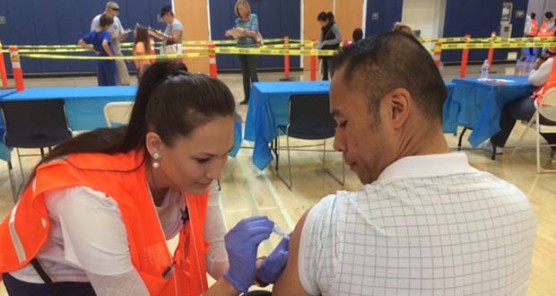Flu activity is up and increasing throughout Los Angeles County and the Department of Public Health reminds residents it is not too late to receive a flu vaccine.
“Continue spreading holiday cheer and not the flu,” said Jeffrey Gunzenhauser, MD, MPH, interim health officer for Los Angeles County. “Flu activity usually peaks in January and February, but this season we are seeing flu activity earlier than usual so getting vaccinated now is important. Getting vaccinated against flu protects both the person who receives the vaccine and also reduces the chance they will become ill and spread the flu to family and friends.”
The Centers for Disease Control and Prevention report that influenza activity has increased significantly in recent weeks and is now widespread in the state of California. Flu can cause hospitalization and death. Receiving the flu vaccine is the most effective way to protect yourself and others from getting the flu.
Everyone 6 months of age and older should be vaccinated against the flu every year. Flu vaccination is especially important for people who are at greater risk for complications from flu and those who live with or care for these individuals.
Groups of people that are at high risk for flu complications include children younger than 5 years, adults 65 years and older, and pregnant women. Medical conditions such as asthma, chronic lung or heart disease, diabetes and being overweight (body-mass index >40) can also increase your risk for flu complications.
People at higher risk for complications from the flu should seek medical care as soon as they begin to feel ill, whether or not they have been vaccinated. They could benefit from antiviral therapy that can reduce the risk of experiencing complications and reduce the severity and duration of illness. Antiviral therapy is most effective when given early in the course of illness.
In addition to getting a flu vaccine, practicing good hygiene can help prevent getting and spreading the flu. This includes washing your hands, covering your coughs and sneezes, not touching your eyes, nose, or mouth, and staying home if you’re sick.
Symptoms of the flu include fever, cough, sore throat, runny or stuffy nose, muscle or body aches, headaches and fatigue. Pneumonia is the most common complication of the flu. Flu can also aggravate underlying health conditions like heart disease or asthma. Annually, thousands of people nationwide are hospitalized or die from an influenza-associated illness.
For more information about the flu including vaccination locations, please visit the Public Health website. Residents may also call the LA County Information Line at 2-1-1.
Like this:
Like Loading...
Related





 Tweet This
Tweet This Facebook
Facebook Digg This
Digg This Bookmark
Bookmark Stumble
Stumble RSS
RSS




























REAL NAMES ONLY: All posters must use their real individual or business name. This applies equally to Twitter account holders who use a nickname.
1 Comment
I know people who got the vaccine and got both influenza a and b within 3 weeks of each other. This years flu vaccine had the wrong strains in it.